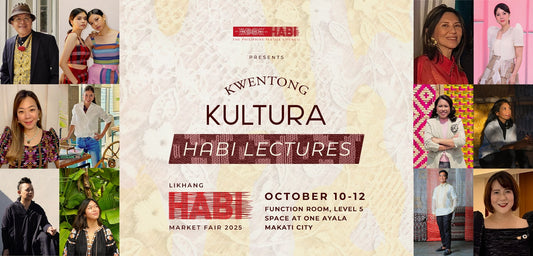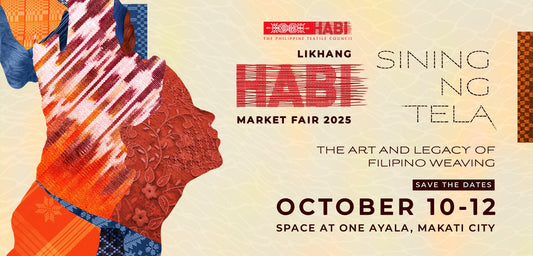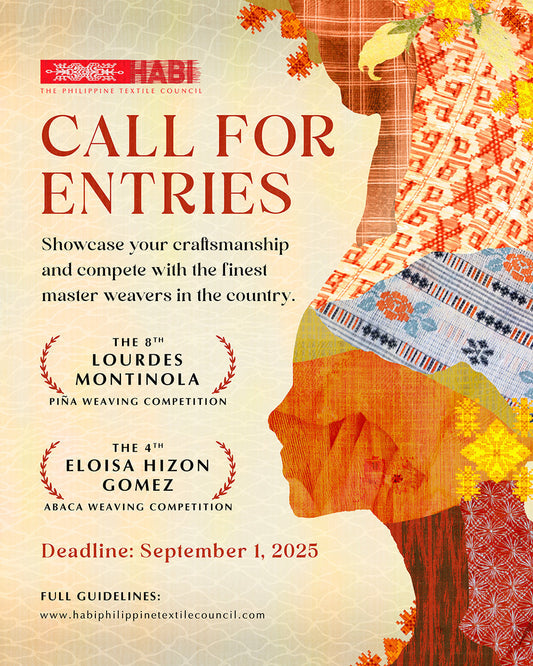Exploring the web of woven wonders—the way textiles tie and bind us to each other—from 100 vendors including weaving groups from ASEAN region, textile exhibition, competitions, workshops and many more! ![]() Glorietta Activity Center
Glorietta Activity Center![]() Palm Drive Activity Center
Palm Drive Activity Center
Glorietta Activity Center, Makati City![]() October 13-15, 2023
October 13-15, 2023

For the 13th edition of its annual Likhang HABI Market Fair (slated October 13 - 15 at the Glorietta and Palm Drive Activity Center), members of HABI: The Philippine Textile Council chose a catchy theme that reflects the deepening and ever-expanding digital world we now live in – “Web of Woven Wonders.”
Although it builds on and pays homage, if you will, to the World Wide Web, a ubiquitous and vital information system that now dominates our lives, the fair’s theme is also emblematic of the growing interconnectedness of people, places and things, “the way textiles tie and bind us to each other,” said Adelaida Lim, former president of HABI.
“The country’s traditional textiles and the innovative weaves various groups of Filipinos have come up with are truly wonderful,” Lim added. “The diversity and beauty of finished products, and the consummate skill it took to make them are something we can all be proud of!”

Designer and longtime HABI supporter Len Cabili, the woman behind Filip+Inna and one of the country’s leading advocates of traditional textiles, said: “HABI has made great strides in pushing weaving into the forefront of Philippine culture. These textiles are an expression of our culture. Thanks to the council’s efforts, more people now have a better understanding of the true value of handcrafted textiles and the unique processes they go through.”

More vendors
A year after its first in-person market fair, which temporarily shifted online in 2020 and 2021 due to the pandemic, this year’s number of vendors is 72. Representing various regional and ethnic groups from all over the country, they will be presenting all under one roof a wide range of hand-woven products – from textiles to ready-to-wear clothes, bags and shoes, home accessories to furniture pieces – made of such materials as piña, abaca, and cotton, among others.
To accommodate the increase in the number of participants, the fair will also be occupying a bigger space this year, from the Glorietta Activity Center all the way up to the area fronting Palm Drive, said Mia Villanueva, current president of HABI.
“Whereas most vendors last year only got one table each, this year, a growing number of participants are getting two,” Villanueva added. “For the first time as well, a number of local government units from such provinces as Aklan approached us directly, asking to rent multiple tables to feature their products.”

As the country’s de facto textile council, HABI has also reached out all these years to its counterparts in the region. This year, for instance, it is again inviting exhibitors mainly from ASEAN countries to join the October fair. As of this writing, a handful of exhibitors from Laos, Vietnam, and Indonesia have confirmed their attendance. Rather than view these foreign artisans and business owners as competition, HABI considers them as valuable sources of ideas and inspiration.
“It’s also good to know what other people are doing,” said Villanueva. “Apart from giving, say, our designers a range of possibilities which they could incorporate with our local textiles, inviting our friends from abroad also helps us to learn from their industries, experiences, and best practices, including the support they’re getting from their respective governments.”

Culmination of HABI’s work
”By creating a marketing platform through the Likhang Habi Fair, the council is able to shine a spotlight on the true value and qualities of natural and sustainable textiles,” Cabili added. “Since the best and most unique textiles from all over the country are featured under one roof, the event also produces negligible carbon footprint, as buyers congregate, linger, and go about looking for the ideal product. Of course, by highlighting our countrymen’s best handiwork, the fair also creates dignified employment for everyone involved.”
Again, as Villanueva reiterated, although the fair is the council’s most high-profile project, connecting a thriving grassroots industry with its market and allowing countless weavers and business owners to promote and earn from their artisanal outputs, the much-awaited buying event is simply a culmination of its annual year-round efforts, which began with HABI’s inception in 2009.
With generous support from Ayala Land and the Ayala Foundation, Likhang HABI Market Fair has been held ever since at Glorietta. The council has also gained monetary support from various donors as well as grants from various public and private institutions and corporations.

As a non-profit organization, HABI doesn’t earn anything from its annual market fair. Whatever percentage it charges from the gross income each exhibitor earns is plowed back to cover basic expenses, including the staging of next year’s event. Over the years, rental fees it charges exhibitors have remained reasonable to allow more participants, including fledgling start-ups and small exhibitors, to join. First-timers are usually grouped together in a common section called the HABI booth.
“You bring them to the fair, especially first-timers, and they see for themselves the competition. They see what customers want,” said Maribel Ongpin, one of HABI’s founding members and former chairperson, during a previous interview.
The help extended by HABI has gone beyond marketing to help stimulate sales for the country’s weavers of heritage. Next year, for instance, Villanueva, a designer and entrepreneur herself, plans to organize accounting and business-related workshops for interested weavers to help them streamline and put some order in their operations.




